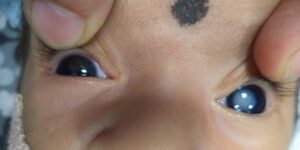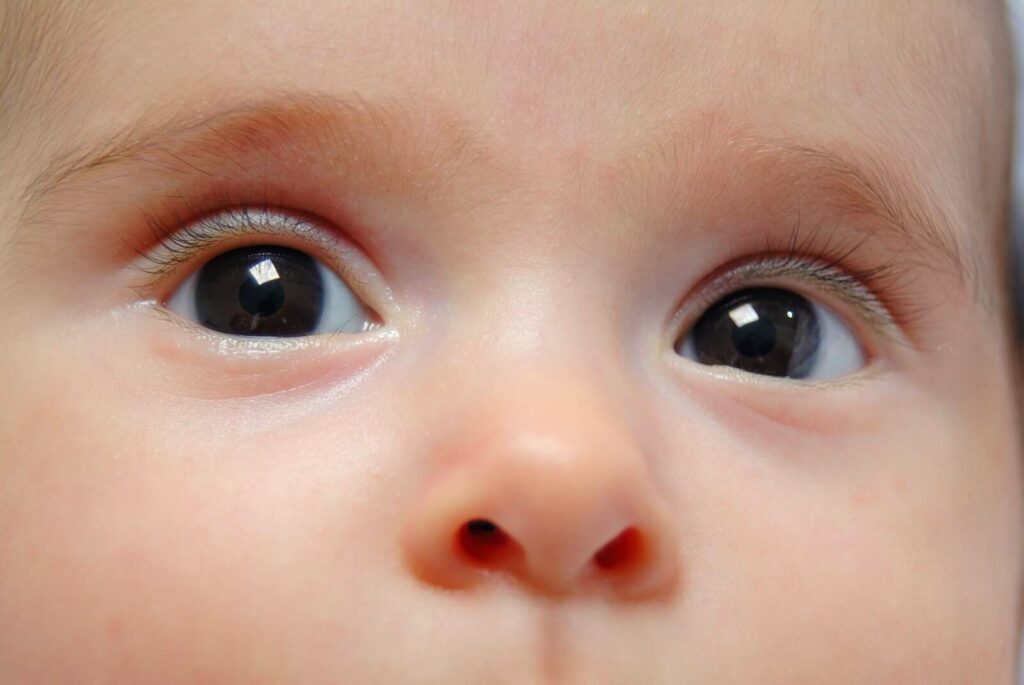If you or someone you know has been diagnosed with congenital cataracts, it’s important to learn as much as possible about the condition. In this blog post, we will discuss the causes of congenital cataract, their symptoms, and how it is treated. We will also provide advice for people who are living with congenital cataracts.
Contents
What Is A Congenital Cataract?
 Congenital cataracts are an eye condition that is present at birth or develops in infancy. In this condition, a cloudiness of the lens occurs, which can cause blurry vision and even a complete lack of vision if left untreated. The condition is described as cloudiness of the lens which can be caused by a number of different genetic and environmental factors.
Congenital cataracts are an eye condition that is present at birth or develops in infancy. In this condition, a cloudiness of the lens occurs, which can cause blurry vision and even a complete lack of vision if left untreated. The condition is described as cloudiness of the lens which can be caused by a number of different genetic and environmental factors.
According to studies, a congenital cataract is the most common cause of visual impairment and blindness in children. It is estimated that between 1 in 500 and 1 in 2000 live births are affected by this condition.
Types
There are four primary types of congenital cataracts. These include:
- Lamellar congenital cataract: This is one of the most common types of congenital cataracts. It is characterized by a thin clouding of the lens which can be localized or scattered across different areas of the lens.
- Punctate congenital cataract: This type of cataract is caused by multiple small, dot-like opacities in the lens.
- Brunescent congenital cataract: This type of cataract is characterized by a white, milky-appearing lens due to the accumulation of protein.
- Total congenital cataract: Total congenital cataracts are usually the most severe type and are characterized by a complete opacification of the entire lens.
So, you can see that congenital cataracts can vary greatly in their severity and the way they may affect your vision.
What Are The Symptoms to Look For?
Common signs and symptoms of congenital cataracts include:
- Blurry or clouded vision in one or both eyes
- Sensitivity to light
- Crossed eyes, or strabismus
- Poor focusing ability
- White or gray appearance to the pupil
- Poor vision in dim light
These are very common and should not be taken lightly. If you observe any of these signs in your child, it is important to consult with an optometrist or ophthalmologist as soon as possible to receive a proper diagnosis and treatment.
What Causes Congenital Cataracts?
There could be various causes of congenital cataracts. Some of these are listed below:
- Inherited genetic disorders: It is believed that some cases of congenital cataracts are caused by inherited genetic disorders, such as Down Syndrome or Turner Syndrome.
- Metabolic or nutritional factors: In some cases, maternal metabolic and nutritional deficiencies may cause the occurrence of congenital cataracts in the newborn baby.
- Infections: Infections of the mother during pregnancy, such as toxoplasmosis or rubella, can increase the risk of congenital cataracts in the baby.
- Radiation exposure: Exposure to X-rays during pregnancy may cause defects in the development of fetal eyes and cataract formation
- Toxic agents: There is also a possibility of congenital cataracts developing due to exposure in the womb to certain medications or toxins.
As this type of cataract occurs in children, it can be difficult to identify the root cause. In fact, there could be multiple causes behind the formation of congenital cataracts in a baby. It is important to consult an ophthalmologist and get regular eye check-ups for your children so that any potential problems can be detected early on.
More often, you should always be mindful of the daily care that your child receives and make sure they are receiving adequate nutrition and rest. Taking these precautions can often help to ward off any potential illnesses or conditions that may cause congenital cataracts.
How Is It Diagnosed?
Now, it is fairly easy to diagnose and recognize congenital cataracts. It is typically discovered in babies during routine pediatric exams, which include a physical examination of the eyes. The doctor may use an ophthalmoscope or slit lamp to examine the eyes for signs of clouding in the lens. Especially if a family has a history of genetic eye disorders.
In addition, if a child has symptoms such as blurred vision, light sensitivity, or crossed eyes, the doctor may order additional diagnostic tests. That includes CT scans, ultrasounds, or MRIs to determine if there are any other underlying conditions.
As children with one form of congenital cataract can be at risk for developing another. So, it is important to have regular follow-up exams with a pediatric ophthalmologist.
How Is Congenital Cataract Treated?
 When it comes to treatment, the most common approach is to surgically remove the affected lens and replace it with an artificial one. This can be done in infants as young as 8 weeks old. However, there are a few drawbacks associated with this surgery such as risks of infection, scarring, and blurred vision.
When it comes to treatment, the most common approach is to surgically remove the affected lens and replace it with an artificial one. This can be done in infants as young as 8 weeks old. However, there are a few drawbacks associated with this surgery such as risks of infection, scarring, and blurred vision.
In some cases, eyeglasses or contact lenses may be used to correct the vision. This is usually done in mild cases, where surgery cannot be performed due to age or risk factors. While these corrective measures are not permanent, they can help improve vision in the short term.
In some cases, medications such as corticosteroids and antiglaucoma agents may be prescribed to reduce inflammation or pressure in the eyes. These medications should only be taken as directed by a doctor and should not replace surgery.
A congenital cataract is also treatable with genetic therapy, where healthy copies of genes are introduced into the affected cells. This is still an experimental procedure but has shown promising results in clinical trials.
It is important to remember that treatment for congenital cataracts should not be delayed. And the earlier it is done, the better the results are likely to be. Early detection of the condition can also help reduce vision complications and ensure proper treatment.
Can It Be Prevented?
Congenital cataracts cannot usually be prevented. It is usually caused by a genetic defect that can be passed down from parents to their children in the form of a mutated gene. Some cases, however, are also caused by infections or illnesses that occurred during pregnancy.
However, there are some ways to minimize the risks of developing a congenital cataract. These include:
- A healthy diet: It is important to maintain a balanced diet that is rich in essential vitamins and minerals. This can help reduce the risk of having a baby with congenital cataracts.
- Avoiding exposure to harmful substances: Avoiding exposure to toxins, such as cigarette smoke, and alcohol. And radiation can also lower the risk of developing congenital cataracts.
- Regular check-ups: Regularly visiting an optometrist or ophthalmologist can help detect any signs of cataracts and provide early treatment.
- Genetic testing: If there is a family history of congenital cataracts, it is recommended to ask for genetic testing before conceiving a child to identify potential gene mutations that may lead to this cataract.
All in all, prevention can be difficult, but it is important to take steps to reduce the risk of a baby being born with these cataracts. Always remember that early detection and treatment are key to the successful management of this condition.
Conclusion
In conclusion, a congenital cataract may seem like a scary diagnosis. But with proper care and treatment, it is possible to restore vision and lead a normal life. With the help of modern medicine, people who have been diagnosed with this can now enjoy an improved quality of life and better outcomes.
Hence, if you or a loved one has been diagnosed with congenital cataracts, it is important to seek medical help as soon as possible. Early diagnosis and treatment may prevent vision loss and further complications. Discuss your treatment options with your doctor for the best results!
Cataract surgery is a safe and painless procedure. At MantraCare we have a team of experienced eye surgeons, who will be happy to answer any questions on cataract surgery. Call us at +91-9711116605 for any inquiries.
